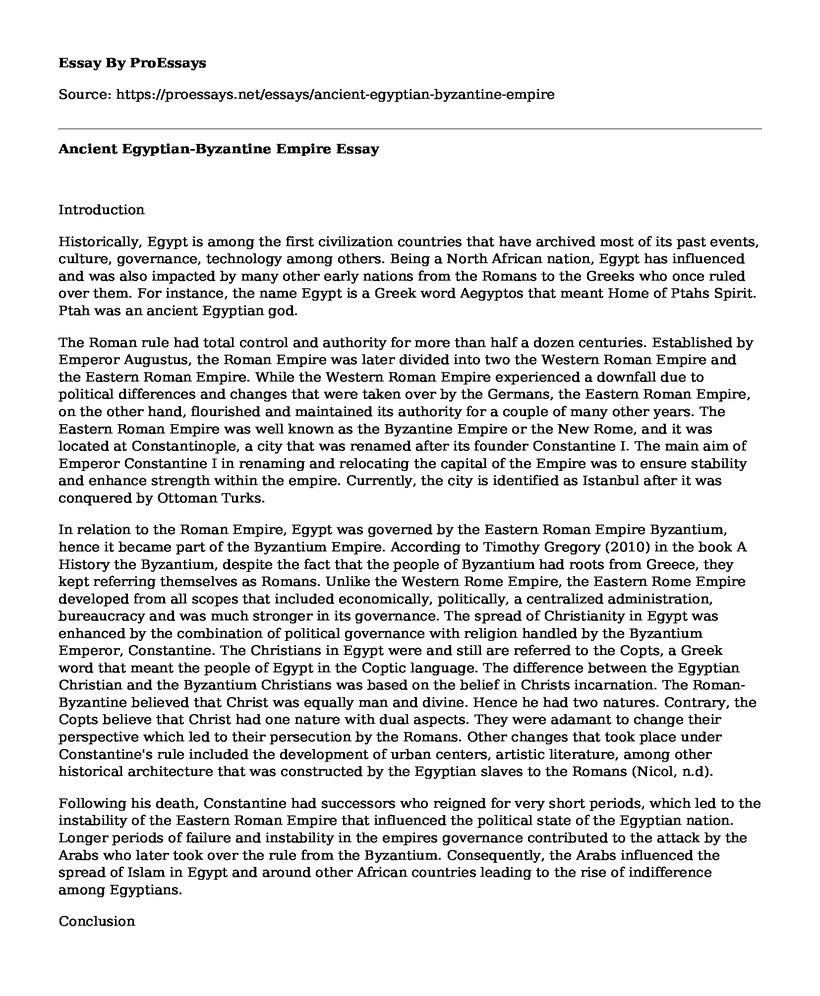Introduction
Historically, Egypt is among the first civilization countries that have archived most of its past events, culture, governance, technology among others. Being a North African nation, Egypt has influenced and was also impacted by many other early nations from the Romans to the Greeks who once ruled over them. For instance, the name Egypt is a Greek word Aegyptos that meant Home of Ptahs Spirit. Ptah was an ancient Egyptian god.
The Roman rule had total control and authority for more than half a dozen centuries. Established by Emperor Augustus, the Roman Empire was later divided into two the Western Roman Empire and the Eastern Roman Empire. While the Western Roman Empire experienced a downfall due to political differences and changes that were taken over by the Germans, the Eastern Roman Empire, on the other hand, flourished and maintained its authority for a couple of many other years. The Eastern Roman Empire was well known as the Byzantine Empire or the New Rome, and it was located at Constantinople, a city that was renamed after its founder Constantine I. The main aim of Emperor Constantine I in renaming and relocating the capital of the Empire was to ensure stability and enhance strength within the empire. Currently, the city is identified as Istanbul after it was conquered by Ottoman Turks.
In relation to the Roman Empire, Egypt was governed by the Eastern Roman Empire Byzantium, hence it became part of the Byzantium Empire. According to Timothy Gregory (2010) in the book A History the Byzantium, despite the fact that the people of Byzantium had roots from Greece, they kept referring themselves as Romans. Unlike the Western Rome Empire, the Eastern Rome Empire developed from all scopes that included economically, politically, a centralized administration, bureaucracy and was much stronger in its governance. The spread of Christianity in Egypt was enhanced by the combination of political governance with religion handled by the Byzantium Emperor, Constantine. The Christians in Egypt were and still are referred to the Copts, a Greek word that meant the people of Egypt in the Coptic language. The difference between the Egyptian Christian and the Byzantium Christians was based on the belief in Christs incarnation. The Roman-Byzantine believed that Christ was equally man and divine. Hence he had two natures. Contrary, the Copts believe that Christ had one nature with dual aspects. They were adamant to change their perspective which led to their persecution by the Romans. Other changes that took place under Constantine's rule included the development of urban centers, artistic literature, among other historical architecture that was constructed by the Egyptian slaves to the Romans (Nicol, n.d).
Following his death, Constantine had successors who reigned for very short periods, which led to the instability of the Eastern Roman Empire that influenced the political state of the Egyptian nation. Longer periods of failure and instability in the empires governance contributed to the attack by the Arabs who later took over the rule from the Byzantium. Consequently, the Arabs influenced the spread of Islam in Egypt and around other African countries leading to the rise of indifference among Egyptians.
Conclusion
The Roman Empire had control over some countries from Europe, the Middle East and part of Northern Africa especially Egypt. Its authority and power faced a division between the West and East Empires that followed a decline and fall of the Western Rome Empire. The continuation of the East Rome Empire commonly known as the Byzantium influenced the development of the Egyptian country from politics, religion, economy and infrastructure. Byzantium led to the spread of Christianity in Egypt which late.
Annotated Bibliography
Prof. Donald MacGillivray Nicol is a Professor Emeritus at the Kings College, University London in charge of the Modern Greek History, Byzantine, Literature, and Language. His article on The Byzantine Empire expounds on the events that took place in the middle ages in the Roman Empire. Donald explains the relationship between the Roman Empire and the Ancient Egypt. In relations to his relevance, Donald Nicol is an English Byzantinist born to a Scottish minister, hence not only was he educated on the Byzantine history but had roots and relationship with the early church.
Timothy Gregory is a professor and American historian who has specialized in the Byzantine Empire and classical archaeology. His expertise has come handy in my assignment because of the extensive knowledge of the Byzantine Empire that is the center of the research. He is currently a professor at the University of Michigan and a director at different other universities in relation to archaeology and historical evidence.
Reference
Gregory, T. E. (December 2009, (c)2010). A History of Byzantium, 2nd Edition. Wiley-Blackwell.
Nicol, D. M. (n.d.). The Byzantine Empire. Retrieved February 5, 2017, from History - World: http://history-world.org/byzantine_empire.htm
Cite this page
Ancient Egyptian-Byzantine Empire. (2021, Apr 02). Retrieved from https://proessays.net/essays/ancient-egyptian-byzantine-empire
If you are the original author of this essay and no longer wish to have it published on the ProEssays website, please click below to request its removal:
- Prohibition of Alcohol in American History Essay
- Slavery in European Paintings From 1250-1800 Essay
- Should the US Have Joined World War 1 - Essay Sample
- Essay Sample on Mythology Theory in Popular Culture
- Pop Culture Essay on Beyonce the Singer
- Essays on a Tribute to Native Americans and Buddhist and Christian Non-violent Social Theory
- Essay Example on Becoming a Family Nurse Practitioner: My Journey to Serve







